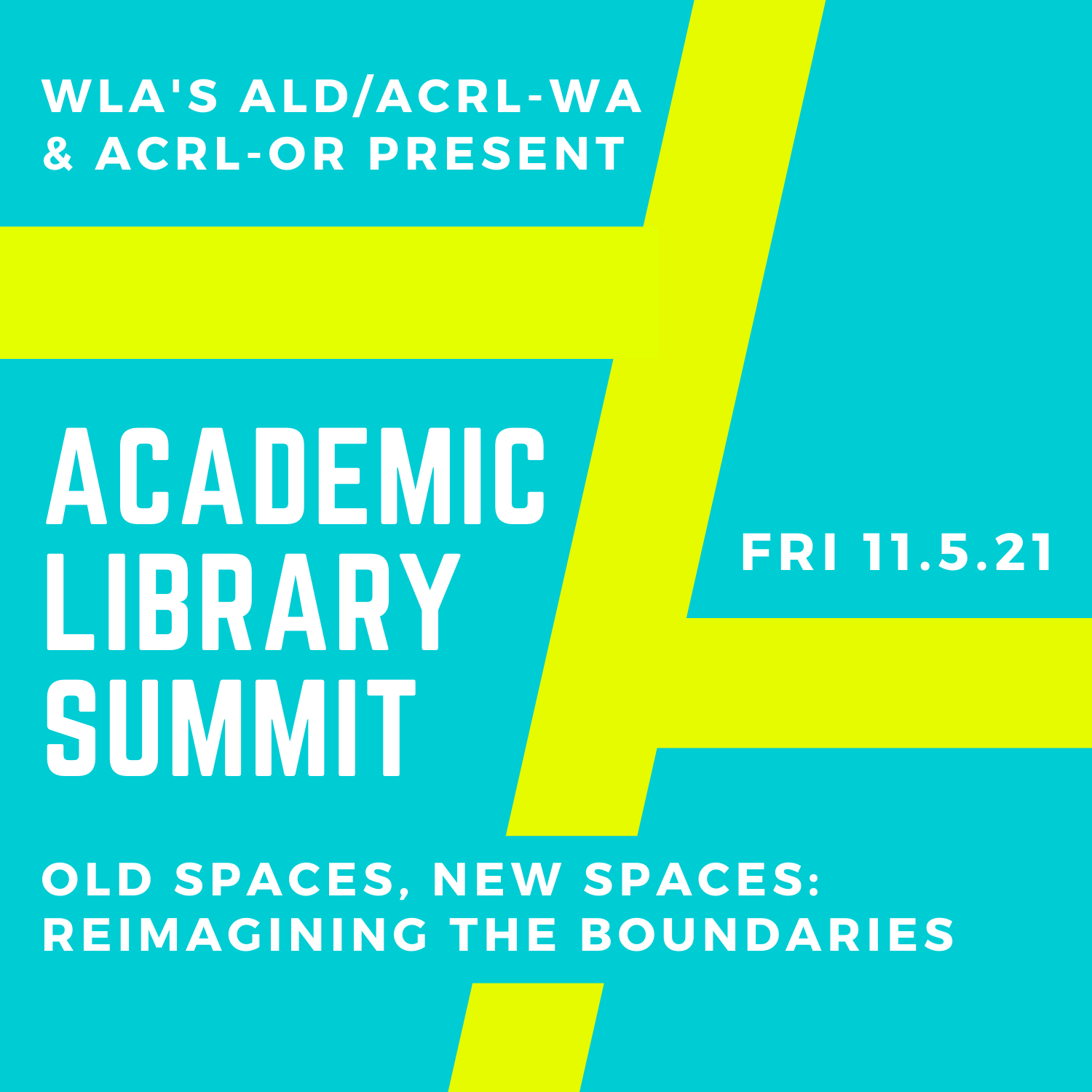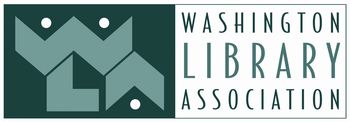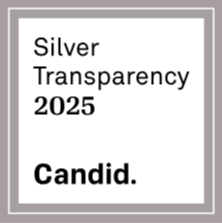Academic Libraries
Academic Home | Charter | Membership | 2021 Fall Summit | ACRL Webcasts | Contact Us
ACRL-WA Conference Archive | ACRL-WA Meeting Minutes Archive | ACRL-WA Newsletter Archive
 2021 Academic Summit Program Information 2021 Academic Summit Program Information
Program sessions will consist of 20-25 minute presentations, 5 minute lightning talks, or another type of presentation that re-imagines the boundaries of a virtual conference presentation.
Programs will be presented live with automatic captions and will be recorded for registrants. Please contact the WLA Office with questions or for more information.
Block 1 | 10:15–11:00 am
Librarianship is Personal: Qualitative Library Practices in the Post-COVID Era
During the COVID-19 era of remote work one thing became clear, personal and professional boundaries were muddied. Pets, partners, and children made appearances during zoom meetings, students and colleagues may have seen the inside of our houses. While this new era may have changed the boundaries between our personal and professional lives, it opens the opportunity for us to explore broader uses of phenomenology, or personal lived experiences, in library practices. How can we tap into personal experiences to inform our new and developing practices? In this session we’ll explore phenomenological research approaches that we can apply to our practices of librarianship.
Emily Ford, Portland State University
Block 2 | 11:15 am–12:00 pm
Boundaries Around Us: Salish Sea Curriculum and Open Repositories
The Salish Sea is bordered by the Olympic Peninsula and Vancouver Island crossing political boundaries. In this presentation, we will describe the process of building the Salish Sea Curriculum Repository as part of a curriculum development project funded by the National Endowment for Humanities that helps interdisciplinary students situate themselves using experiential learning and storytelling pedagogical techniques. The repository houses OER about the Salish Sea alongside library resources about the bioregion. It was built using Omeka-S, an open source repository software available to anyone. Participants will gain an understanding of our shared local environment as well as insight into how to manage an evolving repository.
Roe McKernan and Neah Ingram-Monteiro, Whatcom Community College
Creating a Tri-Campus Library Land Acknowledgement
In 2020 the UW Libraries’ Public Web Operations Inclusion Working Group began on creating a Libraries land acknowledgement to be used across our public website. The acknowledgement would recognize the tri-campus nature of UW Libraries and the Libraries’ role as a steward of materials that hold traditional knowledge, while including federally and non-federally recognized tribes. In the session, we will discuss the Inclusion Group’s process – how we worked together remotely (and often asynchronously), how we collaborated and sought input from experts and our peers, the stumbling blocks we encountered, and what we learned during the multi-year effort.
Amanda Pirog and Allee Monheim, University of Washington
Block 3 | 12:15–1:00 pm
Real-time Learning in a Synchronous Environment: Using Reinforcers to Foster Learning and Connection
Isolation during the pandemic posed some interesting challenges for faculty teaching virtually, namely student disengagement and learner apathy. If you are interested in developing an asynchronous workshop or course designed to engage students and reinforce learning outcomes on a topically-based schedule, and aid discipline-based faculty with their course learning outcomes, this session will provide you with a strategy to promote student success using a tool that removes common learning barriers. To illustrate our methodology, this session will showcase a recently piloted two-hour workshop on how to use APA 7th edition, in which we targeted Social Sciences faculty teaching research-based courses.
Suzanne Milton and Liya Deng, Eastern Washington University
Re-contextualizing the Antelope: What a Year in Nature Taught Me about Documentation
“What is a document?” Suzanne Briet famously asked. Generations of library school scholars remember the example of the antelope, if we remember nothing else: an antelope in the wild is an antelope, an antelope in a zoo is a document. The zoo extracts the animal from its context and substitutes its own. Yet in this act, what information is lost? This inquiry into the metaphor of the antelope will re-explore the boundary between object and information--as well as our assumptions about what constitutes information in the first place.
Genevieve Williams, Pacific Lutheran University
Block 4 | 1:15–2:00 pm
Re-calibrating the Stream: Getting Back to Normal in Video Acquisitions
In this brief talk, Elsa Loftis will outline what changed in streaming collections and demand for streaming film during the swift switch to remote learning during COVID-19 at Portland State University. Now that courses have returned to in-person and budgets have depressed, how do we adjust? This presentation will outline policy changes made at PSU, and chronicle the trends and demands across streaming platforms, as well as lessons learned about content delivery during and after the pandemic.
Elsa Loftis, Portland State University
Liaison Academy, Re-Engaging with Core Duties [Lightning Talk with facilitated Q&A]
Over time Liaison assignments had become a mess at Gonzaga University, and it was unclear just what exactly the expectations of a liaison were. Some liaisons were doing everything under the sun, and others had taken a focus solely on collection development. Using the models described in “Approaches to Liaison Librarianship” as a starting point, we created the Liaison Academy over Summer 2021 to spend 6 structured days focusing on the 5 core areas of liaison work. Liaison Academy set expectations while also demonstrating best practices and giving librarians a chance to discuss what their set backs and fears were with each area.
Caitlin Bagley, Gonzaga University
|

 2021 Academic Summit Program Information
2021 Academic Summit Program Information